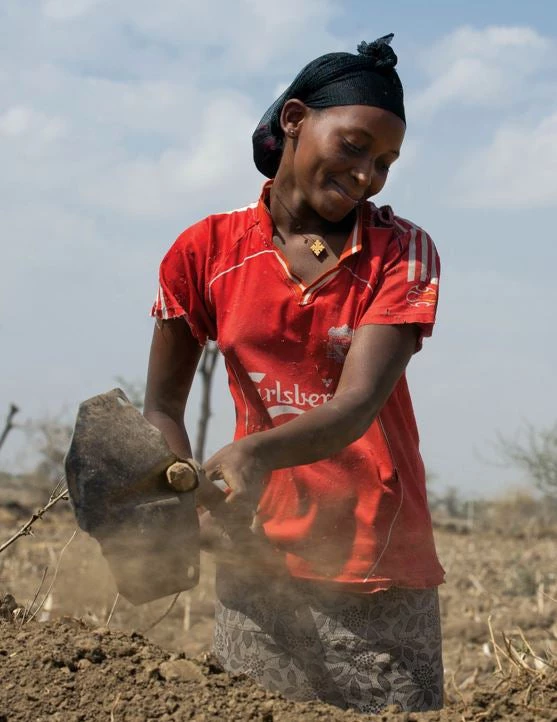
Ethiopia’s Productive Safety Net Program (PSNP) reaches an estimated 9 million people across the regions of Amhara, Oromiya, Southern Nations, Nationalities, and Peoples Region, Tigray, Afar, Somali, Dire Dawa, and Harar. Food or cash payments are provided to very poor households. Payments are made in return for community work known as ‘public works’ – with participants working on soil and water conservation, construction of schools, health posts, childcare centers and road building. The work is scheduled usually after harvest season to ensure food security and enough money to carry through seasonal food shortages.
Poor households in Ethiopia face a series of economic, social and environmental risks and vulnerabilities with risks often higher for women. While women help with farming and related work, they also receive unequal access to resources, financing, training, and are also more vulnerable to household-related shocks -- illness, death of household member, drought, flood, price shocks, job loss, loss or death of livestock. Women in rural areas typically received poor education and are paid lower for the same type of work as their male counterparts.
The program was specifically designed to respond to these types of risks and vulnerabilities. It ensures that women benefit equally from the program by taking into account maternal and childcare responsibilities.
The response starts at the very beginning. The community committees, comprised of both men and women, select the assets and tools to be used in public works projects. Women’s participation in this decision-making process ensures their views are not only considered but also that their needs are taken into account.
Abebech, who is part of a community committee, explains that women are tasked with manageable loads such as collecting stones, planting, watering tree seedlings, and caring for children in childcare centers. The women also have a “flex-work” schedule to allow for household and childcare responsibilities without affecting the payment they receive. Pregnant women are also entitled to take time off and still receive benefits from the program.
Both male and female participants reported greater security, and are now more active in their communities. This type of social inclusion is particularly valuable to women who were previously disconnected and had limited mobility in village life. Abebech found that she interacted more with women and learned how she could take advantage of opportunities that were presented to her. Women from the public works program share stories about how the program raised their self-esteem, which is in turn led to earning more respect from their husbands at home. Some of the men in the community have also mentioned how they have started to increasingly value women’s roles in their ability to contribute to public works activities.
The public works program has also led to improved access to water for drinking, irrigation and livestock. Community members have also noticed improved access to social services and markets as a result of land rehabilitation and construction.
The Productive Safety Nets program will enter its fourth phase in July. With the support of the World Bank Group, a Gender Action Plan identifies concrete strategies to ensure equitable participation of men and women in the program, as well as include gender-related provisions in planning, management, monitoring, and evaluation. Plans are also being placed to raise awareness about nutritional and maternal services for women.
Follow the World Bank Group Social Protection and Labor on Twitter @wbg_splabor




Join the Conversation